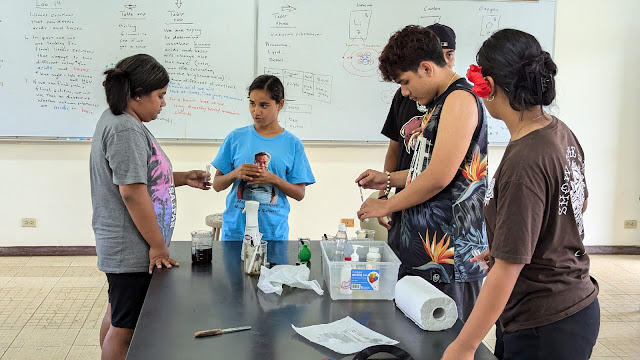Floral litmus solutions
The morning session was a high speed run from protons, electrons, and neutrons to hydroxide ions. One hour in duration. At which point the students appeared to have hit a limit for new concepts.
I always include isotopes to properly explain the fractional atomic mass.
Then there is a sprint through orbitals, spinning electrons, odd numbers of shells, and way to much information for the students to digest. Electron dot diagrams simplify the drawings. The carbon tetrahedron was drawn, demonstrated using the molecular model, and then erased. Must plan the boards better.
After showing how two hydrogen share electrons I then built diatomic hydrogen, water, ammonia, and methane.
I made use of these to demonstrate the shape of methane due to the 2s electron jumping up into a hybridized p orbital.
As an experiment, an accident of the order I encountered these as I sought limes in this post-lime tree era. I started with lime juice - which turned out to be curiously brown and perhaps going bad. Then I saw calamansi in the public market. Followed by lines arriving at Saimon's market. Lime still works the best, but calamansi is also effective.
Lab 14 would depend heavily on the Spathoglottis plicata. Only Sidney brought flowers.
The unknowns. There is a need to replace the ammonia and vinegar. Pine Sol is in a filing cabinet as this is being written. Cream of tartar will eventually be needed, along with a new bar of softer soap.
Sidney
This term the red Hibiscus rosa-sinensis changed color for the known base, an ammonia based cleaner, but did detect many of the other bases. Red hibiscus usually works, but not for bases this term. No idea what happened or why. Spathoglottis plicata worked superbly this term.
Melissa, LaPrincia, Sidney
Etwet testing the unknowns
LaPrincia testing the unknowns as Melissa records data

















Comments
Post a Comment